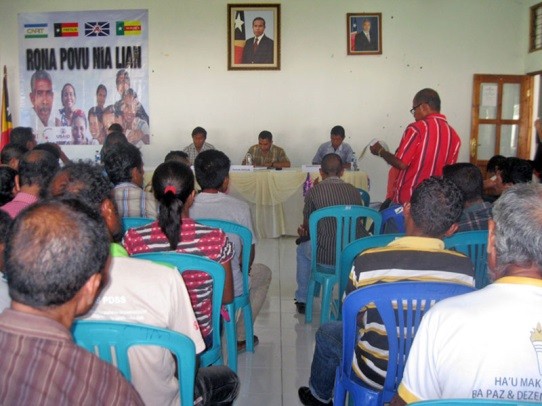|
Purpose: To support Timor-Leste’s main political parties become more effective, transparent and responsive by strengthening their structures and communication capacity. |
Location: Nationwide |
|
Partner: International Republican Institute (IRI) |
Duration: May 2011 – September 2014 |
|
Cooperative Agreement: $3 million |
Background:
Timor-Leste, the world’s third newest democracy, has conducted seven free and fair elections since independence in 2002. While the country has made a number of significant gains in governance, legislative reform, building state institutions, and citizen responsiveness, the Government of Timor-Leste (GOTL) continues to face considerable challenges. These include weak institutional and human capacity of government institutions, extreme dependency on the state’s petroleum fund, and high rates of poverty, unemployment, and illiteracy.

Summary:
USAID’s Fostering Meaningful and Responsive Representation supports the country's political parties in their efforts to become more effective, transparent, and responsive by strengthening grassroots structures and research and communications capacity. Through this grant, USAID helps members of the Parliament increase their representation of constituent concerns by developing outreach capacity and assists political parties increase their collaboration with local administration. In addition, USAID’s Fostering Meaningful and Responsive Representation assisted in promoting free, fair and peaceful elections during the 2012 national elections in Timor-Leste by providing civic/voter education and elections observation support.
As Timor-Leste consolidates its democracy, citizens must be able to hold elected officials accountable for policy-making and service delivery. In 2013, USAID’s Fostering Meaningful and Responsive Representation assisted the four main political parties represented in Parliament, supporting elected officials to engage constructively with their constituents to address citizen priorities. Through this grant, USAID supported 800 party members and parliamentarians, many of whom were first-time representatives elected in 2012, to receive training and increase their individual and party professional skills in public presentation, strategic planning, fundraising, and internal party organization. In 2013, USAID’s Fostering Meaningful and Responsive Representation also facilitated public forums with parliamentarians in six districts, with approximately 700 participants from rural communities, NGOs, and the media. Participants raised their concerns with their elected officials regarding governance, corruption, and priority services. Through this grant, USAID also promoted women’s participation in political processes; 27% of participants in political party training were women.
The key objectives of USAID’s Fostering Meaningful and Responsive Representation are:
- To make political parties more effective, transparent, and responsive by strengthening grassroots structures and internal communications capacity;
- To develop outreach capacity of Members of the Parliament and their respective political parties to increase their ability to represent constituent concerns; and
To improve collaboration between the political parties and local administrations to better response to the needs of district communities.








Comment
Make a general inquiry or suggest an improvement.